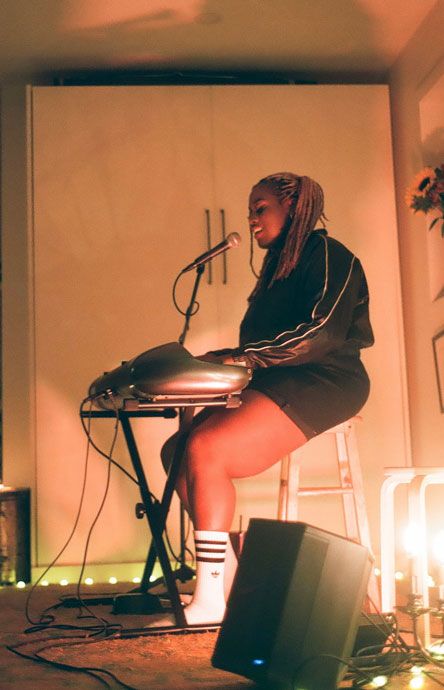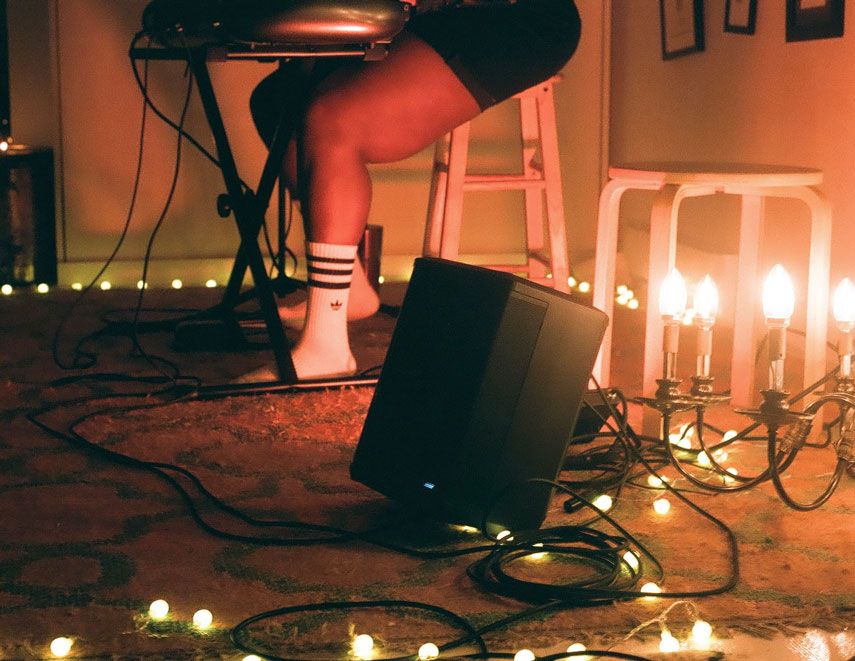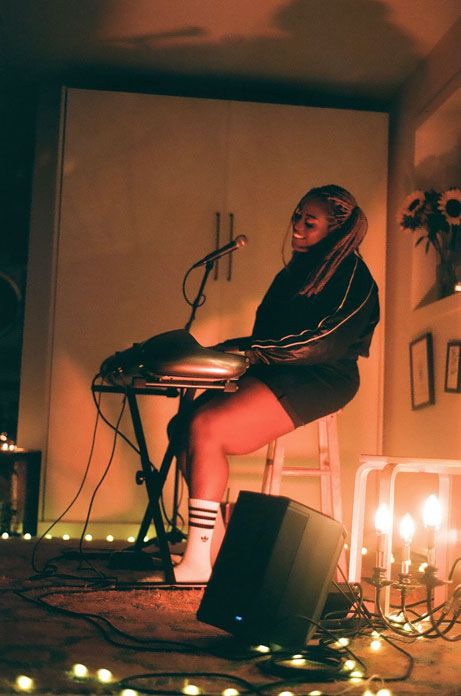In July 2022, I met ebonEmpress, also known as Dae Shields, after watching her perform a set at a SoFar show in Vancouver. The truth in her music, her sound and her authenticity drew me to what she was offering. I then discovered that she was a multi-faceted force in Vancouver's music spaces and the broader community, being the Founder and Executive director of AfroVanConnectSociety, a non-profit organization devoted to empowering people of African descent through conversations, collaboration, performance and music.
ebonEmpress is a Jamaican-Canadian artist originally from Ontario. At the beginning of our interview, she told me a bit about where she grew up, and the prominence of the Jamaican community that surrounded her in church, around her family and simply daily life. She talked about this double culture of being Jamaican while also having the North American experience of being born in Canada. Her work with non-profits and community development as well as many themes in her music, which we explore below, is a clear example of the United Nations Sustainable Development Goal for Reduced Inequalities.
In this interview, we talk about her sound and music, the pillars of a community, AfroVanConnect, and also where songs come from, frequencies and meditation.
Could you tell me a bit about your work with nonprofits and community engagement? Where do all your ideas come from and where do you hope they'll go?
I've done various community work throughout my life, whether it be through community service or soup kitchens, etc. When I came to Vancouver, I was looking for the same community that I had experienced. Back home, there's a place where you can go get particular types of food, there are places where there are events happening, and a sense of the Black community was very obvious there, but it wasn't so much here, and so when I was looking for that community, I did find a few places that were really cool [like the monthly Stew Jams]. But in my journey, I realized that there were other people from the community that were also looking for that experience. And so we said, “Let's all do it together”, and we started creating these spaces, and that's how AfroVanConnect was born.
Our Black Spaces initiative was just created from a need from the community so that we would connect. We had the Remix Cafe, we had the Wisdom Cypher, and these were spaces where people from the community could come and talk about the things that we were lacking, the things that we need, the things that we experienced on a regular basis. It was a space that centered on the Black experience. Through those meetings, we started realizing the patterns, the similar themes and the things that are lacking, the things that people wanted access to. And so from that kind of community engagement, we started developing programming that would suit the needs of what people were asking for . . . [With AfroVanConnect], you're always going to get support, an educational element, and music and us putting local Black artists on our platform in order to create visibility and amplify their voices . . . We're also doing Afro indigenous farming practices with our Fair Farms garden for example . . . It's a holistic way of looking at community development and looking at all elements of community development, whether that be educational institutions, financial institutions and food and shelter. Those are pillars of what it takes to build a community.

How do these practices of community work inform your music and your artistry? Do you take inspiration from experiences that you have in relation to those spaces and would you say they go hand in hand in any way?
Yeah, definitely. The organization itself started because I wanted to play music and I was looking for places to play music but couldn't find any. I had a bunch of artists who also were looking for those places so we were like, "Why don't we create those places?" We used to do what we called the Remix Cafe and that was a cypher where we come, bring our instruments and we jam, everybody would rap and we pass the mic around in the circle. In these community spaces, we always gather in circle. From so long ago, we gathered in circle to develop and create community whether it be to talk about issues happening in our community or just to come together in celebration. So that's at the heart of community development, but it's also at the heart of my music.
The things that I share and the things that I talk about are the things that I either personally experienced, that I’m seeing happening in my community or that I believe that, whatever it is, needs to be amplified.
And it's interesting because I have been thinking a lot about the type of music that I write and as I develop as an artist, what are the things that continue to be important to me that I want to share? What are the things that I would like to add to my repertoire of conversation?
I can’t remember who said it but they said, “It's the artist's responsibility to be a reflection of the world, a mirror to be held up to society and to show what's currently going on.” In my mirror, I do have a lot of very uplifting songs, these are the lessons that I've learnt in my life. But there are also real reflections of things that are happening. [In my music] I talk about police brutality, unjust deaths, the way in which we interact with the land and how misguided it is to be in this space and not understand that this land is a gift, the water that we drink is a gift. Every morning I think about how grateful I am for this space and how grateful I am for the air, you know?
I've been reflecting recently [about how] these things are important to talk about, but how I'm also not perfect at all and I think that those are the things that I also would like to share because while it's important that I'm doing community work and yeah, I do a lot of things that are important, I'm also like a mess sometimes. That's okay too, you know? . . . I think that those are the things that I'm working on right now and trying to develop in my music: just the awareness that these things are important, but this is also real and this is also me.
Watching you live, I felt so much truth to your music. On one side, with the social topics you dive into, but also with vulnerability, it makes the listener feel heard as well. What would you want people to take home with them when they watch you live or hear your music?
I want people to just take away what's for them. I don't necessarily want to shove any message down your throat. . . . I say “the music that I create” but really I'm just a channel and what I receive is what I'm offering. In those spaces, I allow myself to get the gifts from my ancestors, from a creator, from whatever it is that people believe. I'm just a channel that's just a reflection of what's happening here. So it's not necessarily going to be for everyone and I don't want anyone to take something away that's not for them, you know? And it's interesting because when I perform live and then I talk to people afterwards, I've got so many different things about what people have taken away.
As long as I come open, vulnerable, and I share and the people are open to receive that, that's all that I want—that exchange—because just because you don't necessarily consciously connect to some of the things that I'm saying, if you're connected with me, we're still transferring. That's how I feel about music that I listen to, so you have to be careful what you’re listening to because . . . it's going somewhere. Your mind, your body and your spirits are incredible. Trust me, you're taking it in whether you know it or not.

I love what you said about how you're the channel. I spoke to a songwriter once and they said “they don't create the music, they find it.” In a way, it already exists and they're just transferring it to the listener.
Totally. They're all frequencies that already exist. And you're just tuning into that frequency and bringing it down. I was actually talking with somebody the other day about the fact that I can't meditate inside. I like to meditate once a day but I have to go outside because I realized that there are all these frequencies happening in the house, it's so distracting and they almost seep in and it becomes so loud. The quieter I get, the louder I realize the space all around me is. But it's electronic frequencies as opposed to our natural space, which when you're outside it's the ocean, the sand, the wind. These are frequencies that when I open, I want to be taking in, not what my fridge is doing.
I've been in Vancouver for the majority of my life and personally, I haven't really interacted much with the hip-hop culture/community of Vancouver or haven't seen it really flourish like in other cities. What has your relationship been like with the Vancouver hip-hop culture?
That's a great question. Well, not all, but a majority of the Vancouver hip-hop community are white guys, but they're also a majority of the people here! There are a lot of white people in Vancouver. Stew Jams, that event I was telling you about before, had a cypher-type feel where they'd have live instrumentalists, and you could go up and everybody would get a chance on the mic, which was really cool. So those types of spaces amongst others, were very positive hip hop spaces . . . When we're talking about hip hop, I think it's very interesting because for me personally, I don't think of myself as a rapper. I think of myself as an Emcee and a Poet. Some people just put that all in one category, I don't necessarily do that because when I think of rap, I think of Megan Thee Stallion, Nicki Minaj, Drake, even Kendrick. . . . Every artist I just named I love, It's just not something that I offer. When I think of Emcees, I think of Mos Def, I think of Talib Kweli.
I think it's interesting you said you don't consider yourself a rapper but rather a poet because my next question was going to be: do you consider your work mixing with poetry? Because I felt it definitely to be mixing with spoken word. How would you describe your sound?
I definitely take cues from dub poetry, which is like an old form of like how people used to get down. Obviously, I grew up with a Jamaican background, so I have a lot of reggae influences when it comes to certain rhythms, I have a lot of jazz influences. I also listen to a lot of jazz fusion, and a lot of like psychedelic seventies rock, so there are a lot of random influences. And then of course R&B, neo-soul. Erykah Badu all the way to the Mariah Careys of the world. You might not hear every single influence on every track, but they're all there.
Who or what has been an inspiration to your work lately?
I went to the UK for a while. I went to Spain, went down to Michigan, and was in Toronto. And before all of that, I was in L.A. for about four months. I have just been travelling a lot and I literally had just gotten back to Vancouver when you saw me at the SoFar show. So I've been doing a lot of travelling and in that time of experiencing those different spaces, I had experienced, not just different people, different land, the different energy of the land, but also like different parts of me. Because when you're in a space, they're reflections of different angles of who you are. I got to experience a lot of different angles of who I am. And like then coming back to this space, it's like a whole other experience to me. And so I think my biggest influence on my music and what I'm creating right now has been travel. It's been going to all these different spaces and experiencing those spaces and not necessarily a particular person, but just me experiencing myself in different spaces has been my biggest influence right now.

You can find more of ebonEmpress here and follow her Instagram here.
